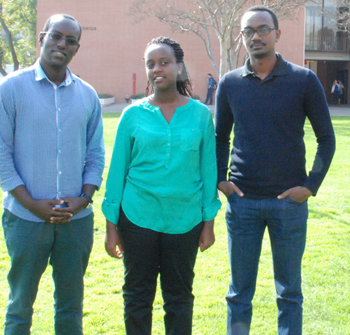
Medy Kimenyi, Aude Kamanzi, and Paul Rukesha
For the next two months, three staff members from Aegis Trust in Rwanda are getting in-depth training in indexing genocide survivor testimony right here at the USC Shoah Foundation.
Medy Kimenyi, Aude Kamanzi, and Paul Rukesha (left to right) collect, index and transcribe testimonies of survivors of the Rwandan Tutsi Genocide at Kigali Genocide Memorial Center (KGMC), which is operated by Aegis Trust. Over the next two months, they will learn indexing methodology and archive building to strengthen their capacity to record, index and preserve testimonies of Rwandan Genocide survivors in the future. The Shoah Foundation’s 65-testimony Rwandan genocide collection, of which 50 are from the Kigali Genocide Memorial Center, is already indexed; the training will continue to inform KGMC’s own testimony archive.
The training is part of the Rwanda Peace Education Program (RPEP), which is led by multiple international partners to develop peace education in Rwanda. USC Shoah Foundation’s role in RPEP is to help the Kigali Genocide Memorial in strengthening the capacities of its own growing genocide archive and engage in collaborative educational programs that include teaching with testimony and the use of the Institute’s educational platform IWitness in Rwandan schools.
Rukesha has visited USC Shoah Foundation twice in the past, to help index its Rwandan collection. Kamanzi and Kimenyi are visiting the United States for the first time.
The Rwanda group has the unique opportunity to learn alongside another group of indexers. Seven trainees who have extensive experience in Holocaust and genocide research were selected to index USC Shoah Foundation’s new collection of 1,400 video testimonies preserved by Jewish Family and Children’s Services Holocaust Center (JFCS) based in San Francisco. The Rwandan and Holocaust indexers are attending the same training sessions at USC Shoah Foundation until the Holocaust group concludes their training at the end of February.
Rukesha, Kamanzi and Kimenyi said the two groups of indexers are learning a lot from each other as they hone their skills in indexing.
“We are exchanging experiences and learning what happened [in the two genocides]”, Rukesha said.
Kimenyi said the Shoah Foundation’s indexing methodology is user-friendly and will allow KGMC to “go deeper” in its own indexing of Rwandan testimonies.
Once they return to Kigali, Kamanzi, Rukesha and Kimenyi will apply the new skills they’ve learned to their work at KGMC in order to make their collection more accessible to the public.